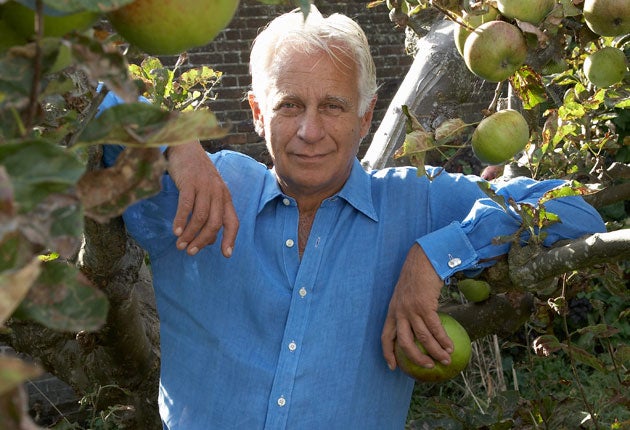Cadbury deal turns sour for Green & Black's

Your support helps us to tell the story
From reproductive rights to climate change to Big Tech, The Independent is on the ground when the story is developing. Whether it's investigating the financials of Elon Musk's pro-Trump PAC or producing our latest documentary, 'The A Word', which shines a light on the American women fighting for reproductive rights, we know how important it is to parse out the facts from the messaging.
At such a critical moment in US history, we need reporters on the ground. Your donation allows us to keep sending journalists to speak to both sides of the story.
The Independent is trusted by Americans across the entire political spectrum. And unlike many other quality news outlets, we choose not to lock Americans out of our reporting and analysis with paywalls. We believe quality journalism should be available to everyone, paid for by those who can afford it.
Your support makes all the difference.When Craig Sams sold his organic chocolate company Green & Black's to Cadbury for £20m in 2005, he was anxious to emphasise that his ultra-ethical brand was in good hands.
Five years and a buy-out by one of the globe's most ruthlessly efficient conglomerates later, the future of the high-brow confectionery is no longer so clear.
Mr Sams, a former hippy from Nebraska who supplied the food for the first Glastonbury festival before deciding in 1991 that there was a gap in the market for an organic chocolate bar, said yesterday that he "would love to take back" the brand which is now owned by Kraft Foods, the American giant whose £11.7bn takeover of Cadbury was completed last year.
The disclosure by Mr Sams, who remains president of Green & Black's, followed reports that the company's management are trying to engineer a buy-out. There are claims that they are struggling to maintain their "entrepreneurial spirit" under Kraft, which has an annual turnover of £25bn. By comparison, Green & Black's, which has grown impressively since Mr Sams and his wife dreamt up the brand in their kitchen and began sourcing high cocoa-content chocolate via Togo and Belize, now has sales of about £40m.
Until now, Kraft has insisted that such a niche product still has a place in its roll call of global brands. However, Trevor Bond, the company's new head of individual country businesses in Europe, said recently: "Green & Black's is £40m out of a £1bn chocolate business [in the UK]. I would sell more Creme Eggs."
Followers of the often uneasy relationship between brands which start out as small-scale, highly ethical products and are eventually swallowed by multi-national suitors, have followed with interest the fate of Green & Black's – the holder of Britain's first Fairtrade designation – since it was sold to Cadbury, a £5bn conglomerate which once had its own dream of global dominance.
Cadbury, itself the product of a Victorian Quaker family with ambitions to mix confectionery production with quiet philanthropy, attempted to allay concerns that Green & Black's founding principles would be trampled underfoot in a stampede for growth and profit by granting it subsidiary semi-autonomous status and emphasising its own "passion for quality products and ethical values".
But the arrival of Kraft seems to have added to what were already grumblings from within Green & Black's ranks about projects which ultimately did not come to fruition. Growth which was hitting levels of between 60 per cent and 70 per cent a few years ago is known to have fallen sharply. With a likely price tag of around £40m, it is understood that the organic brand is looking at a number of options to secede from Kraft, including a partial management buy-out.
Mr Sams told The Independent: "I would love to take [Green & Black's] back and I know a number inside would also." The problem, for the moment, is that Kraft is not selling. The company has been criticised for aspects of its handling of the Cadbury purchase, not least its decision to renege on a pledge to keep open the Cadbury factory at Keynsham, near Bristol.
Together with the departure of a number of top Cadbury executives, including Mark Reckitt, the chief strategy officer who quit last year to join Green & Black's in a consultancy role, it is understood that Kraft is aiming for a period of stability before it considers any disposals.
Mr Sams said: "I don't think Kraft want to sell. I'm not telepathic but the indications are that they want to hang on to Green & Black's." Neither Kraft nor Cadbury would comment.
Brand buy-outs
The Body Shop
The ethical cosmetics chain was founded by Anita Roddick in 1976 and quickly became allied with causes from saving whales to a ban on animal testing. The company was sold to French conglomerate L'Oreal for £652m in 2006. Dame Anita described the takeover as a "gift" and denied that she was selling out.
Pret A Manger
The Big Mac took a large bite out of the ethical baguette in 2001 when McDonald's bought a third share of the sandwich chain, which was later sold to a private equity firm. Founded by two university friends in 1986, Pret boasts that all its products avoid additives and are made fresh on site. Speaking at the time of the McDonald's sale, Simon Hargraves, Pret's commercial director, said: "McDonald's has never had any day-to-day role in Pret, nor has it had any say over what we do, nor how we do it."
Ben & Jerry's
The ice cream company was founded in 1978 by Jerry Greenfield and Ben Cohen after they completed a correspondence course on frozen desserts, before being sold in a £200m deal to Unilever in 2000. The co-founders said they hoped their company would "expand its role in society". They no longer have any role in the running of the brand.
Join our commenting forum
Join thought-provoking conversations, follow other Independent readers and see their replies
Comments